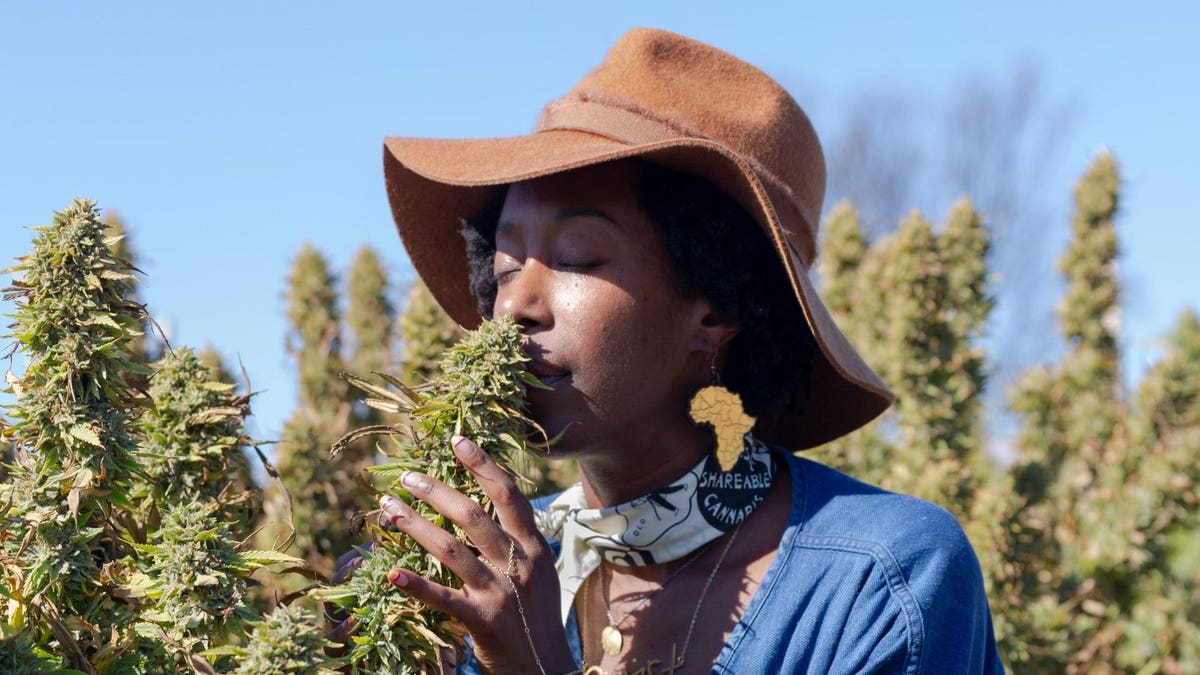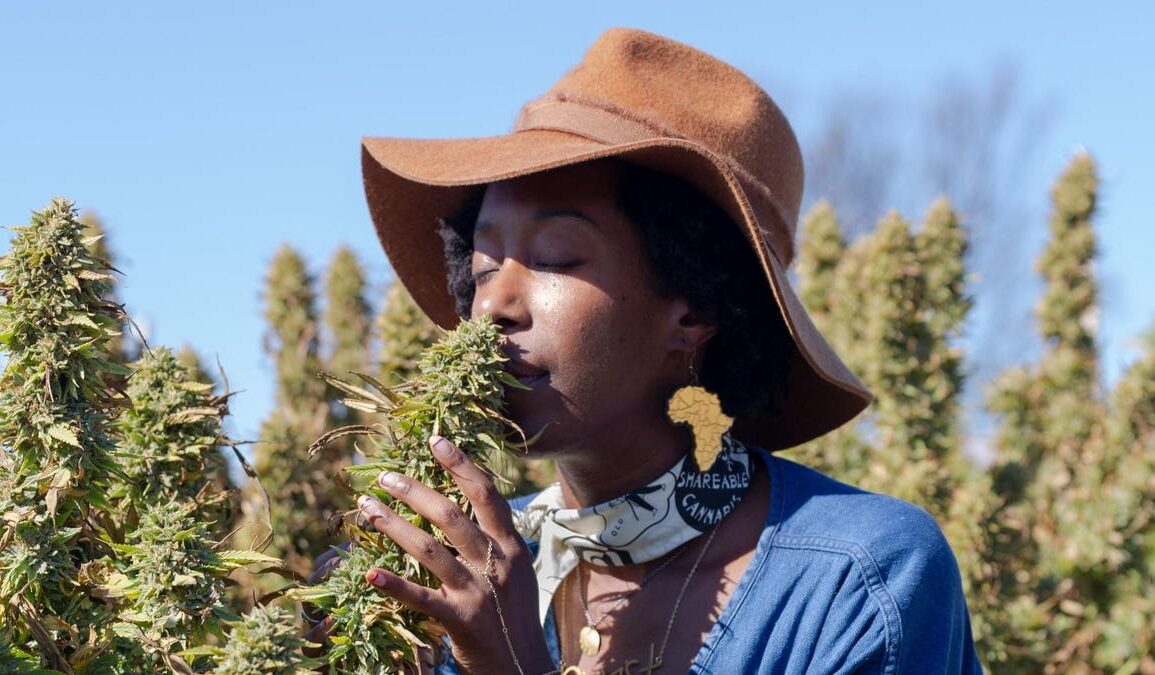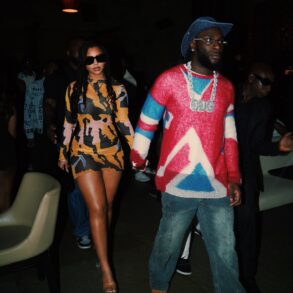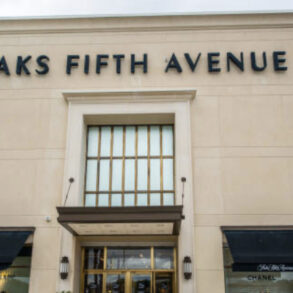
The feminine point of view has commanded 2023. Summer tours from Beyonce and Taylor Swift “unleashed the spending power” of women and created an “economic tsunami” of value in each city they visited. Barbie smashed the box office earning over $700 million in its opening week, $1.2 billion worldwide, and becoming the single highest-grossing Warner Brothers film of all time. Weed industry data echoes this sentiment.
The power of female cannabis consumers is on the rise. For adults aged 19 to 30, the percentages of those reporting past-year cannabis use and daily use reached their highest levels ever reported. 44% of those surveyed in 2022 in an NIH-funded study said they used cannabis in the last year. The number of women aged 25 to 54 years old working in the U.S. simultaneously hit a historic high of 77.8% in June, according to Bureau of Labor Statistics data.
Consumers want to buy weed from women. 46% of respondents to a 2021 Weedmaps consumer survey said they want to visit women-owned cannabis businesses. But the industry’s harsh landscape has made progress a challenge. The amount of women-owned businesses isn’t quite as high as it once was. In 2022, MJBizDaily data found just 23.1% of cannabis businesses were women-owned.
Women continue to drive the conversation forward despite the obstacles of the cannabis industry. The revolutionary weed capitalists are tapping into the feminine, raw Barbie-core power of 2023 with unapologetic marketing and design. A proliferation of women-oriented products as well as events offer a glimpse into a new world, and a different vibe than has historically driven the predominantly male-centered weed industry.
Cannabis from Sundazed, a brand founded in California by Sarah Aziz.
“It’s safe to say the industry is still a boy’s club,” says Sarah Aziz, founder and CEO of California-born Sundazed and the COO of lifestyle brand Saturdazed. “In a 2023 national survey, 66% of women stated they hide their consumption practices because of stigma. So the consumption already has a bad reputation,” says Aziz, who brings to cannabis a background in luxury hospitality.
The woman and BIPOC-owned cannabis brand Sundazed is proof that feminine and quality can be synonymous, offering up potent weed from award-winning growers, all in a Barbie-core pink aesthetic. The founder says she didn’t see enough cannabis brands that connected to the luxury CPG world. Paul Milinski, an Australia-based artist whose most recent work was with the likes of Louis Vuitton and Hermes, designed its packaging. To be a proper cannabis lifestyle brand, Aziz says Sundazed must “fully encompass the lifestyle of the modern feminine consumer.”
Sundazed founder Sarah Aziz.
Modern consumers are hungry for more representation. Over time, the stigma around the plant has diminished for women who smoke cannabis. “Women made up almost 48% of new customers in the industry in the last few years, and Gen Z women are the fastest growing demographic in the industry, so it is a fact that there are more women consumers than ever before and it’s not slowing down,” the founder says.
“It’s important for my brand to appeal to feminine consumers. It’s important for women like myself to share our stories so those in my demographic can feel that they have a brand that represents them and that they can connect to its culture,” she says. “I am a physical representation of a different kind of consumer and new consumers.”
Aziz leaves on a positive note, optimistic that women have the resilience to carve a place in this industry. “This industry is absolutely not for the faint of heart,” says Aziz. “It is tough and expensive. I never thought I would be the CEO of a feminine cannabis company given my upbringing, but if you love something, believe in it, and have the passion, you have to go after your dreams and do it no matter the odds.”
On the other end of the country, Solonje Burnett hosts Men’s Sessions in New York City. Burnett is a strategist, creator, founder of Weed Auntie, and co-founder and Chief Culture and Community Officer of erven.ai. She is tapping into a more empathetic and nurturing side than is usually seen in the event space. Twisting the concept of a weed event onto its head by minimizing commerce, she offers a safe space to open up a dialogue for men. After the Men’s Session, all folks leave feeling a sense of empowerment, says Burnett. Its tagline: “Men are flowers, too.”
Solonje Burnett is the founder of Weed Auntie and co-founder of erven.AI.
During her experiential marketing events, Burnett often showcases brands that are born of women, queer folks, differently-abled folks, and people who traditionally don’t have the financial capacity to market those products. “Folks have a misconception that I only do women-centric events,” says Burnett. “But I do intentional, intersectional experiences that are rooted in well-being. Women may gravitate towards that, but everyone is welcome.”
When launching public events for her Weed Auntie brand, beyond her previously hosted private influencer experiences, Burnett wanted to get out of the box of public assumption. “When you look at the wellness space, it’s primarily women buying yoga clothes, subscribing to the latest self-care practice, and showing up to these events,” she says. “But then you go to these mega conferences and it’s mostly men.”
“I wanted to offer healing for those who are most complicit in society’s inequity and oppression,” says Burnett. “To be in a community, to embrace modern masculinity and transform both professionally and personally. The prevailing culture, in cannabis and outside, prevents them from being able to express their emotion. If we want cultural change, we have to start at the root.”
Burnett is a member of the 2023 Clio Cannabis Marketing & Advertising Jury. She sits on the board of Broccoli Magazine’s Floret Coalition, as well as the inaugural Advisory Board of CUNY’s new workforce development program, From Cannabis to Culinary. Burnett often speaks and consults on brand education, marketing, social equity, sustainability, self-care, sexual health, racial injustice, gender discrimination, and community empowerment.
“People need different vehicles of connection,” says Burnett. “The Men’s Session helps them move away from traditional networking and helps them think differently and be without expectation. One thing I really noticed now, being in the well-being space, is that men really take the time to work out, but don’t take time to work in. Choosing to do that inner work and step away from the performative aspect of being men in favor of softly receiving, listening, learning, and letting go. And, let me tell you, it was so uncomfortable for many of them. It was truly a new muscle to flex.”
Burnett’s work as a culture curator and a breath-work guide comes in use during the intense emotional asks of the Men’s Session. “The sessions lead with listening. It took segments of breathing, cacao ceremony, movement, yoga, meditation and tincture making before the group started vulnerably sharing,” she says. Afterward, Burnett was happy to receive photos of men walking in the street with their Weed Auntie tote, or using the yoga mats from Union Square Travel Agency.
The event coordinator and marketing expert Solonje Burnett hosts Men’s Sessions to help all people … [+]
“These are the seeds that we need to plant in this industry and beyond, giving them the chance to ground and grow in cannabis. And having the leaders from Union Square Travel Agency, oHHo, Drew Martin, Rose Los Angeles, and those who came from the legacy space like Conbud, gave them the chance to speak honestly in an intersectional community. Not a bunch of guys lying about their numbers and puffing up their chest, but actually being like, ‘I fail. I am freaking out trying to figure out how we can make this work.’”
Unlike other cannabis events, Burnett says there was no dab station or alcohol. “I wanted to make sure they were free of the female gaze so they could truly open up,” she says. “There was no transaction. It was just coming together without the oppression of capitalism. Even though obviously we need our sponsors and money to make the event happen, it was less transactional and more transformational.”
“Patriarchy hurts both men and women,” says Burnett. “We have to get to the root. They’ve created it, but are the most impacted in many ways. They aren’t given the vocabulary or language, they aren’t given spaces where being soft is valued. These are gender constructs we’ve created, but all of us are in the flow of gender. All of us are masculine and feminine. We need to go inward and sit with the full spectrum of emotion. My dream is to grow the Men’s Session from half-day to full weekend retreats.”
An element of her events is always fun. Burnett finds healing accessible through play. “Innovation and inspiration make space for our bodies to wander and our minds to dream. It gives adults permission to access joy through inner child work and return to different ways of being. Healing in community is essential. You can experience pleasure by just being next to others. We are such an individualist society. I believe it was bell hooks who said ‘Healing is an act of communion, it’s not done in isolation.’ We have even made our healing individualized.”
Solonje Burnett talks Men’s Sessions, Weed Auntie, and healing in community.
There’s a layer of healing that can only be done in community. “You need to see yourself reflected back,” says Burnett. “You need to see your own humanity, hear and feel that you aren’t going through it by yourself. We need each other.” Witnessing humans’ behavior comes natural to Burnett, who has a psychology background. She majored psychology during undergrad at Wellesley College, then went on to Emerson College for graduate work in journalism.
Burnett wants to see more opportunities for POC women in cannabis, who she feels may be overlooked by outside investors or existing equity frameworks. “For me, not all women are created equally in our society and especially in our cannabis culture. I’ve seen white or white presenting women-owned businesses raise millions, while others can’t get an investor to give them the time of day. There are major barriers for non-white women,” says Burnett. “We are the holders of so much intelligence if they only gave us the opportunity.”
“There’s been a decline in diverse owners in cannabis recently, so it seems like we’re missing the mark,” says Burnett. In 2022, non-white ownership of cannabis businesses went down from 20.7% in 2021 to 15.4%, according to data published by MJBizDaily. “Those with cultural influence and purchasing power should be reflected in the DNA of your company, not just stock imagery. The conscious consumers I help to educate or guide see past this whitewashing. They go with brands that respect their existence. I’m not going to shop, support, or work with brands that don’t want to see this Black femme or my people succeed. At Weed Auntie, I get to lean on these pillars.”
Solonje Burnett is the Weed Auntie.
Down the road, Burnett says she does see fashion and wellness products in Weed Auntie’s future. Today, she’s mostly interested in products that are educational. “Let’s talk about fashion, art, entertainment, and music. How can we educate and help people live and be better?”
If and when the industry settles down, Burnett says she would love to have a product on shelves that’s plant-touching. “I don’t see the value of the rush to the bottom,” says Burnett. “I’m going to continue to cultivate community and create experiences for people to connect to themselves and the plant. Sorry California, New York is going to lead the industry. There are so many people here, we will get up and walk to the places to buy our weed. The boom will happen here.”
In the meantime, as the New York industry holds its breath with an injunction that has halted all storefront openings, Burnett’s goal is intersectional connection through deeply intentional experience. “Being in New York City and building community authentically for the last 5 years, I have a leg up to consciously craft the industry here and really create a rich and biodiverse cannabis culture,” she says. Her work orbits ways to “amplify the global majority, the systemically oppressed, environmentally sustainable, innovative design and products.” Burnett is overall brand agnostic, and currently consults and partners with brands like oHHo and Daye. She leads budtender education in stores, to help keep those brands on shelves, and social media content collabs to solidify brand allegiance in a competitive market.
The founder has some crucial advice for men in the cannabis space: “My advice is, do better,” she says. “The ‘speak first, listen never’ mentality is harmful to the business, community, and the people you serve. Cultivate and seek a team that doesn’t perpetuate the circle of sameness or ‘all in the family’ nepotistic energy. Go outside of the like-minded and go for like-motivated. Be a hungry human who has a passion for building a biodiverse industry.”
Solonje Burnett is a strategist, creator, breathwork guide, weed auntie, and co-founder and Chief … [+]
She advises cannabis brands to “stop using current models” and highlights that a difference in background and experiences is beneficial to brands. Burnett leans on stats she learned while working in a human-centered start-up. “Make people feel valued, respected, and heard,” says the founder. “Do better and welcome those who are motivated to do the same.”
If the industry comes together, Burnett predicts a better chance of survival through this regulatory storm. “Fragmentation leads to fuckery,” says Burnett. “We’re so fragmented, that’s why we are doomed to fail. We refuse to see our commonalities. Let’s expand this industry, listen to and include legacy, because these corporate-minded folks don’t have our best interest at heart.”
Burnett is the Chief Culture + Community Officer and Co-Founder of erven, alongside Co-Founder + CEO, Angela Bacon. Soft launching in October of 2023, erven is a data collaboration platform facilitating sustainable growth for brands and retailers through access to actionable insights. The tech start-up is currently in a seed funding round raising $1.2 million. She says they are looking for additional beta testers for retailers to experience the product. “As Black female founders, we know this will be an uphill battle,” says Burnett. “It’s a cannabis tech product founded by Black queer women. What we’re building, unlike existing companies is accurate, user-friendly and completely private, your data belongs to you. We are steeped in transparency and community building.”
This post was originally published on this site be sure to check out more of their content.









